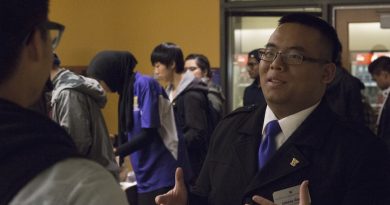Edward Snowden receives standing ovation at collegiate convention
Edward Snowden was the recordbreaking keynote speaker at the Associated Collegiate Press National College Media Convention in Washington D.C. on Oct. 22. Snowden spoke to the mass audience via Skype interaction on his own good will. He is presently in Russia, as the U.S. government has pursued his extradition. He was charged under the Espionage act, which could see him spending decades in jail.
Snowden served as an intelligence officer who served the CIA, NSA and DIA for nearly a decade. Snowden discovered the government was accessing and storing U.S. citizens’ emails, instant message conversations and other online information without their knowledge. After he could not get superiors at the NSA to listen to his concerns about the constitutionality of these practices, Snowden leaked the information to journalists willing to listen. In 2013, he revealed the NSA was seizing the private records of billions of individuals who had not been suspected of any wrongdoing, resulting in the most significant reforms to U.S. surveillance policy since 1978.
“I guess journalists are the audience where I still have a lot of support in.” Snowden shyly exclaimed.
The controversial figure was quite amiable and greatly respected by all those in attendance.
He openly told his story of how he was a high school dropout and became a subject expert in cyber security on the national front. It was there where he was profoundly troubled by what he saw. The secrets the government was withholding, and not for the sake of protecting human rights, but merely for public merit. Snowden confirmed his issue wasn’t about surveillance, but about democracy. He said that for the first time in history, we didn’t have government teams tracking people who have done something wrong, instead we had government teams tracking everyone in the world.
“We were no longer participants in democracy, we were subjects of it … If we only knew what government wants us to know, we wouldn’t know very much at all.”
Snowden says it’s up to journalists to report on these failed government systems because they are essentially challenged by the constitution to do so. And, at times, whistleblowers are journalists’ best sources, he said.
Snowden said the government is often less interested in protecting national security and are more interested in protecting political orthodoxy. And it’s not an American problem — it’s a global problem that results in the need to guarantee and enforce human rights.
He suggested that one way to stop (or at least strongly discourage) widespread government surveillance is to make it more expensive and cumbersome — like it used to be — because the Bill of Rights is about making government enforcement more difficult.
And while many people call Edward Snowden a hero, he said he never wanted it to be about him. He was in a position to be a mechanism of disclosure, so he chose to communicate with specific journalists who he thought would understand the complex issue and ask tough questions. In the end, he came forward to give the information to the public and to protect others.
“I don’t want to be that guy. Don’t allow your stories or the focus of the investigation to be distracted by personalities. People die. Policies last forever.”
When asked whether Snowden had any regrets in regard to the leaks, Snowden said he would have done the same thing without hesitation.
“The government was no longer monitoring someone with nefarious intellect, rather they were embracing the new convenience to monitor everyone everywhere. What I set to do was enable these legal challenges. I wanted to give society a chance to decide how constitutional this was.”





